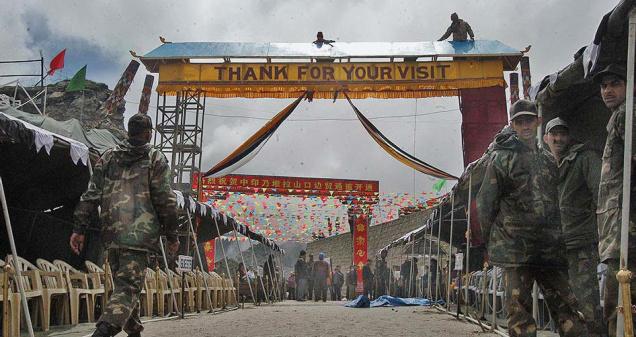China: 3 Steps Closer to Pakistan, 3 Issues Away From India

NEW DELHI: India’s effort to diplomatically isolate Pakistan has run into an intransigent obstacle. China.
Analysts here are worried about the giant neighbour’s responses, as the several years spent since National Security Advisor Brajesh Mishra set up border talks with China under then Prime Minister Atal Bihari Vajpayee, seem to be going up in smoke. And while Beijing has not raised its differences with India about the borders on the north-east, relations are fast dipping between the two in almost direct proportion to the strengthening of ties between China and Pakistan.
The three steps that China has taken fairly recently, since the new outbreak of the current hostilities between India and Pakistan after the Uri terror attack are:
1.It is not seen as a coincidence here that even as Prime Minister Narendra Modi was sitting at a meeting to look at the Indus Waters Treaty saying water was thicker than blood, China had blocked a tributary of the Brahmaputra river in Tibet as part of the construction of what it claims to be its most expensive hydro project. More so, as construction on this project started in 2014, is well known of and discussed, and yet China chose its state-run Xinhua news agency to report on the project again.
China does not usually respond to controversial issues directly through its Foreign Office, using the state run media and affiliated think tanks instead to send out messages.
These are then worded more clearly, and often strongly, with the intended warnings or as in this case a reinforced message being communicated by Beijing. China is the upper riparian for the Indus and Brahmaputra for India, just as India holds this position for Pakistan. The Lalho project on Xiabuqu river, a tributary of Yarlung Zangbo (the Tibetan name for Brahmaputra), is closely located to Sikkim. From Xigaze, the Brahmaputra flows into Arunachal Pradesh.
2. China has extended the duration of its ‘technical hold’ on the move to lable Pakistan based Jaish-e-Mohammad chief Masood Azhar a terrorist. China had blocked New Delhi’s appeal earlier, and has done so again a day before its hold was to lapse. Azhar has been accused of masterminding the recent terror attack on the Air Force base at Pathankot. Interestingly this decision comes just a few days after a counter-terrorism meeting between India and China that was held in Beijing.
3. China has also openly cautioned India over its Balochistan policy. Through its influential think tank, the Institute of South and Southeast Asian and Oceanian Studies at the China Institute of Contemporary International Relations, it was made clear that China will have “to get involved” if there is any move by New Delhi to jeopardise its $46 billion China-Pakistan Economic Corridor (CPEC) in Balochistan. The Director of the Institute Hu Shisheng told an Indian news agency that this along with India’s burgeoning relations with the US and its approach to the South China Seas was now a matter of serious concern for Beijing. China is particularly concerned about CPEC and not in a mood to allow an interference that could jeopadise the multi billion project seen as a flag carrier for its One Belt One Road.Hu said that China will have to “get involved” if it perceives any threat to this project.
The “China threat” that Beijing had accused New Delhi of raising at one time is now an issue of the past. Currently China has three major and highly sensitive issues that will determine its relationship with India and are currently adding to bilateral tensions namely:
1.Tibet: Tibet had drawn an immediate adverse response from Beijing when after it had placed a technical hold over New Delhi’s UN plea to declare the Jaish leader as a global terrorist, India had given visas to known Chinese dissidents for a meeting at Dharamshala. The visas were finally cancelled following pressure from Beijing but the move was noted and commented upon adversely by China at the time.
2. South China Seas: As Hu told the news agency, the deepening military ties between India and the United States has become a matter of “concern” for China now given possible cooperation between the two in the South China Seas. Beijing has made it repeatedly clear that it will not accept any interference on this issue.
3.The China-Pakistan Economic Corridor: this as pointed out above is of immense strategic value to China as part of its prestigious One Belt One Road and has taken Islamabad and Beijing to a new strategic level altogether. China has again made it clear that it will not allow any interference that it sees as coming in the way of the successful executio of CPEC.
Former diplomats point out that it is necessary for India to address these issues, and move the deteriorating relations with Beijing to a higher plane of cooperation and understanding. And as the sources said, work to smoothen the tensions that are increasing over these three sensitive issues along with ensuring that the border dialogue remains on course. According to this point of view, opening a new front with China will be disastrous for the region, and the countries involved.
However, there is the more militaristic view that has been advocating a stand off against China as well. Articulate in the media, this view of retired military officers and bureaucrats, seem to be echoing a New Delhi view that China should be kept at bay, and not encouraged as a ‘friend.’
Prime Minister Narendra Modi will have an opportunity at the BRICS summit at Goa on October 18 to discuss these and other issues with China that is sending 300 delegates for the meet. And send out a signal establishing New Delhi’s approach towards Beijing. China will be hosting the BRICS summit next year.



